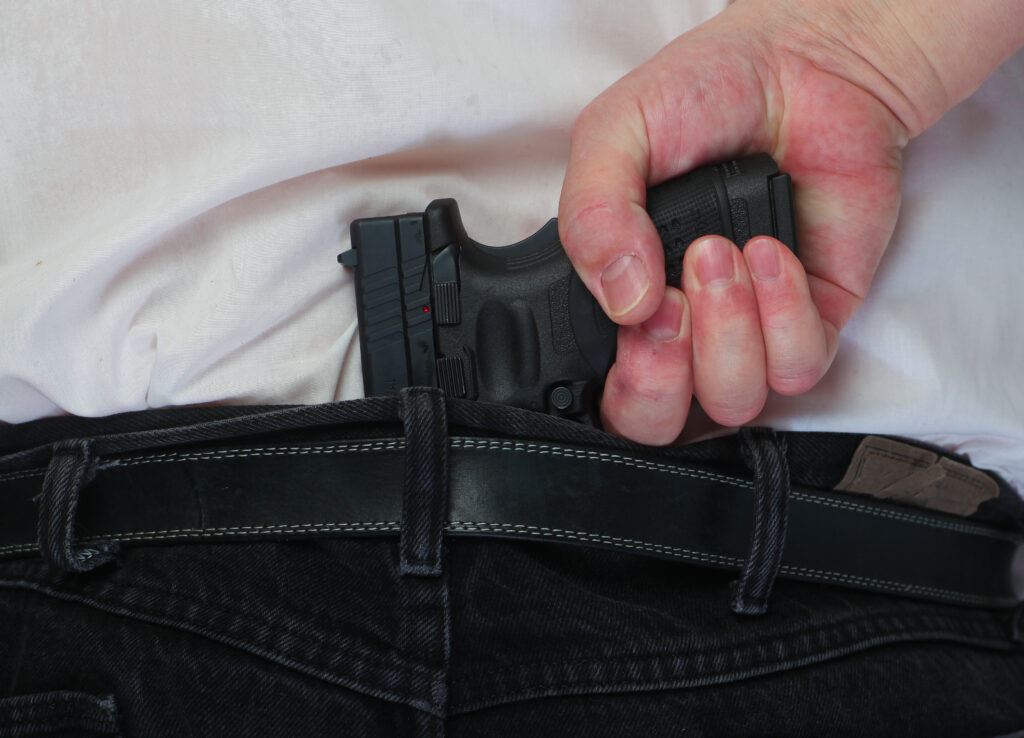Assault with a deadly weapon is a very serious charge that can carry high monetary fines and possible jail time upon conviction. Additionally, convicted individuals may have to endure numerous collateral consequences, including difficulty finding a job or place to live.
If you are currently facing a charge of assault with a deadly weapon, you need an experienced Akron Criminal Defense Attorney representing you during every stage of your case.
A knowledgeable lawyer can determine your eligibility for various legal defenses, negotiate with state prosecutors on your behalf, and represent you at various legal proceedings in court.
Legal Elements of Assault With a Deadly Weapon
To convict someone of assault with a deadly weapon, the prosecution must establish several key legal elements beyond a reasonable doubt.
- First, the prosecution must prove that the accused individual (or defendant) committed an assault. Assault, in this context, is an intentional act that causes another person to fear immediate and harmful or offensive contact. Physical contact need not occur. The mere threat or attempt is sufficient if it creates a reasonable apprehension in the alleged victim.
- Next, the prosecution must establish that a deadly weapon was used. A deadly weapon is any object that can cause serious injury or death. This includes obvious weapons like guns and knives, but it can also extend to objects that, while not inherently dangerous, can cause serious harm. For example, a car, a baseball bat, or even a broken bottle can turn into a deadly weapon.
- Another critical element is the intent of the defendant. The prosecution must show that the defendant intended to use the weapon in a manner that was likely to cause serious harm or death. This does not necessarily mean the defendant intended to kill the alleged victim but rather that they intended to use the weapon in a dangerous way. The focus is on the defendant’s state of mind and the circumstances surrounding the assault.
- Additionally, the prosecution must prove that the alleged victim was in reasonable fear of immediate bodily harm. This means that the alleged victim must have known about the threat and reasonably believed that they faced danger. They might not meet this element if they did not perceive the threat – or if the fear was unreasonable given the circumstances.
- Finally, the prosecution must show a direct link between the defendant’s actions and the alleged victim’s fear of harm. This means proving that the defendant’s use of a deadly weapon directly resulted in the alleged victim’s apprehension of immediate injury.
If the prosecution cannot establish their legal burden of proof beyond a reasonable doubt, they may drop the charge.
Potential Penalties Upon Conviction for Assault With a Deadly Weapon
An assault with a deadly weapon conviction can result in severe penalties depending on the jurisdiction, the circumstances of the crime, and the defendant’s prior criminal record.
First, assault with a deadly weapon is generally classified as a felony. Felony convictions carry more serious consequences than misdemeanors. Typically, a felony conviction for assault with a deadly weapon can result in a prison sentence.

The length of this sentence can range from a few years to several decades, depending on the specifics of the case. For instance, if the assault caused serious injury to the alleged victim, the penalty can be more severe.
Fines are another potential penalty. Convicted individuals may be required to pay substantial fines, which can reach thousands of dollars. These fines are meant to serve as both a punishment and a deterrent against future criminal behavior.
Probation is another possible penalty. Instead of – or in addition to – time in prison, a judge may sentence the defendant to a term of probation.
During probation, the individual must comply with various conditions, such as regularly reporting to a probation officer, maintaining employment, and not committing further crimes. Violating these conditions can result in additional penalties, including imprisonment.
In some cases, the court may impose restitution. Restitution requires the defendant to compensate the alleged victim for any losses or expenses incurred due to the assault. This can include medical bills, lost income, and property damage.
Additionally, a conviction for assault with a deadly weapon can have long-term consequences beyond the immediate penalties. These can include a permanent criminal record, which can affect future employment opportunities, housing, and civil rights – such as the right to vote or own firearms.
A felony record can also carry a social stigma, affecting personal and professional relationships.
Lastly, certain aggravating factors can lead to enhanced penalties. For instance, if the assault was committed as part of gang activity, if the alleged victim was a police officer or other protected individual, or if the alleged perpetrator used a firearm, the penalties can significantly increase.
Successfully Defending Against a Charge of Assault With a Deadly Weapon
Defending against a charge of assault with a deadly weapon involves presenting arguments and evidence to challenge the prosecution’s case.
A defendant can use several potential defenses to avoid conviction or lessen the charges.
- Self-defense: If the defendant can show that they were protecting themselves from imminent harm, this can justify using force – even with a deadly weapon. For this defense to work, the defendant must prove that they had a reasonable belief that they were in immediate danger of being harmed and that the force used was necessary and proportionate to the threat faced.
- Defense of others: Similar to self-defense, this argument is used when the defendant protects someone from imminent harm. The defendant must show took necessary, reasonable actions to prevent the other person from injury.
- Lack of intent: To convict someone of assault with a deadly weapon, the prosecution must prove that the defendant intended to commit the assault. If the defendant can demonstrate that their actions were accidental and not intentional, this may negate the assault charge. For example, if someone accidentally swung a bat and it hit someone, they may argue that they did not intend to harm anyone.
- False accusation: This occurs when the defendant claims they were wrongly accused of the crime. They may argue that the accuser is lying or mistaken. Evidence supporting this defense includes witness testimony, alibis, or inconsistencies in the accuser’s story.
- Mistaken identity: This is applicable if the defendant can prove that they were not the person who committed the alleged assault. Eyewitness misidentification is a common problem, and providing an alibi or other evidence to show that the defendant was not at the crime scene can support this defense.
- Lack of a deadly weapon: Specifically, they can argue that the object used in the alleged assault was not capable of causing serious injury or death. This can reduce the charge to a lesser offense.
- Coercion or duress: This might apply if the defendant can show that they committed the assault under the immediate threat of imminent, severe harm to themselves or others, leaving the defendant with no reasonable means of escape.
Accepting a Plea Deal versus Taking an Assault Case to Trial
When charged with assault with a deadly weapon, a defendant faces a critical decision: accept a plea deal or take the case to trial. Both options have significant implications and should be carefully considered.

Accepting a plea deal involves negotiating an agreement with the prosecution. In exchange for pleading guilty to a lesser charge or receiving a reduced sentence, the defendant avoids the uncertainty of a trial.
Plea deals often result in less severe penalties than a conviction at trial might bring. For instance, the prosecution may offer to reduce the charge from a felony to a misdemeanor or propose a shorter prison sentence, probation, or fine.
One major advantage of accepting a plea deal is the predictability it provides. Trials can be unpredictable, with outcomes hinging solely on the jury’s decision.
By accepting a plea deal, the defendant can know the exact consequences and begin serving their sentence or fulfilling other conditions immediately, which can be less stressful.
However, there are also drawbacks to plea deals. By accepting a deal, the defendant waives their right to a trial and the chance of acquittal. This means that they will have a criminal record, which can affect future employment opportunities, housing, and other aspects of life.
Additionally, some defendants may feel pressured to accept a deal even if they believe they are innocent, just to avoid the risk of a harsher sentence at trial.
Taking a case to trial means going through the legal process where the prosecution must prove the defendant’s guilt beyond a reasonable doubt.
One major advantage of a trial is the possibility of acquittal, which would mean no criminal record and no penalties. If the defense has strong evidence or witnesses that support the defendant’s innocence, a trial may be the best option.
However, trials do come with certain risks. The defendant can face harsher penalties from a conviction than those offered in a plea deal. Trials are also time-consuming and costly, requiring substantial resources and emotional energy. The outcome is uncertain, and even with a strong defense, there is always a risk of conviction.
An experienced criminal defense attorney can help you decide between a plea deal and trial, given the facts and circumstances of your case.
What Happens at a Trial for Assault with a Deadly Weapon
A trial for assault with a deadly weapon is a formal judicial process where the prosecution and defense present their cases before a judge or jury.
The goal is to determine whether the defendant is guilty or not guilty of the charges.

- The trial begins with jury selection (if it’s a jury trial). Potential jurors are questioned by both the prosecution and defense to ensure they can be fair and impartial. After selecting a jury, the trial moves to the attorneys’ opening statements. Here, both the prosecution and defense lawyers outline their cases.
- Next, the prosecution presents its case. This involves calling witnesses and presenting evidence. Witnesses may include the alleged victim, police officers, or experts who can provide relevant information. The prosecution aims to show that the defendant committed the assault with a deadly weapon, meeting all the legal elements of the crime. After the prosecution questions a witness, the defense can cross-examine them, challenging their testimony and trying to create doubt about the prosecution’s case.
- After the prosecution rests its case, the defense presents its case. The defense may call their own witnesses and present evidence to support the defendant’s innocence – or create reasonable doubt about their guilt. The defense can also cross-examine the prosecution’s witnesses to undermine their credibility. The defendant may choose to testify, but they are not required to do so.
- Once both sides have presented their cases, the attorneys make closing arguments that summarize their key points.
- Following the closing arguments, the judge gives the jury instructions on the law and how to deliberate. The jury then retires to deliberate in private. They discuss the evidence and try to reach a unanimous verdict. This can take hours or even days.
- If the jury reaches a verdict, they return to the courtroom and announce it. If the defendant is found not guilty, they are acquitted and free to go. If found guilty, the judge will later impose a sentence, determining the punishment.
Throughout the trial, both sides must adhere to legal procedures and rules of evidence, ensuring a fair process. An experienced criminal defense attorney can represent you during a bench or jury trial and pursue a not-guilty verdict on your charge.
Speak With an Experienced Criminal Defense Lawyer Right Away
If you are currently facing a charge of assault with a deadly weapon, an experienced criminal defense lawyer can be extremely helpful. Your lawyer can safeguard your rights and interests throughout the process, represent you in court, and pursue the best possible result in your criminal case.


